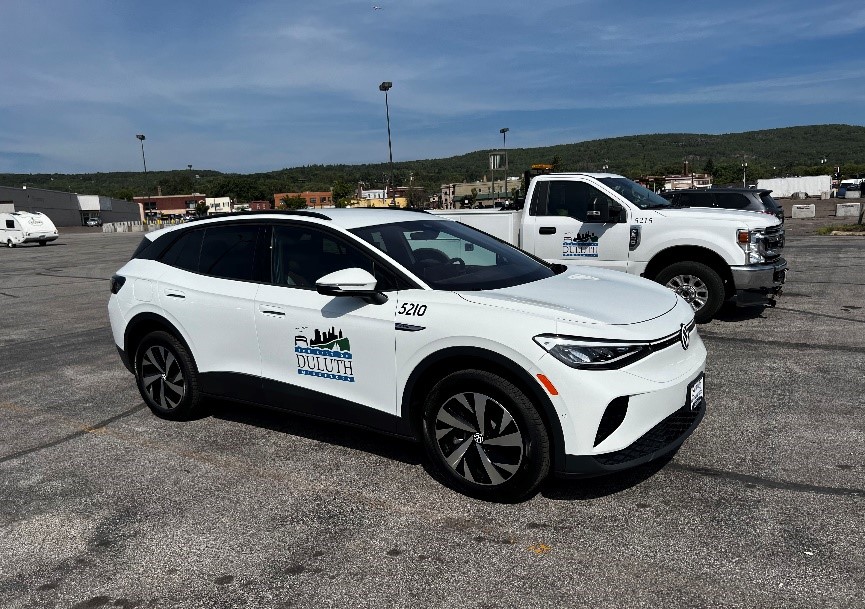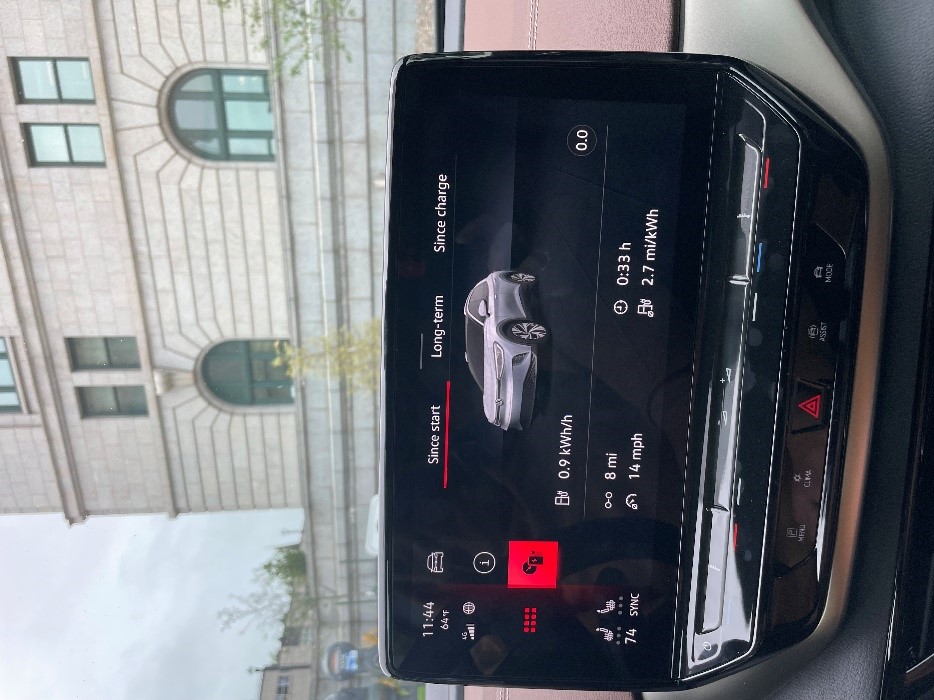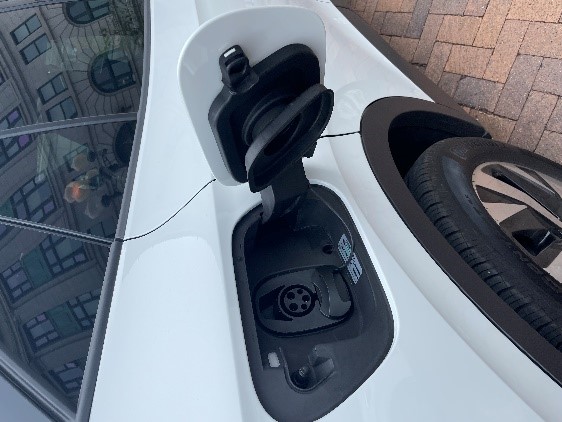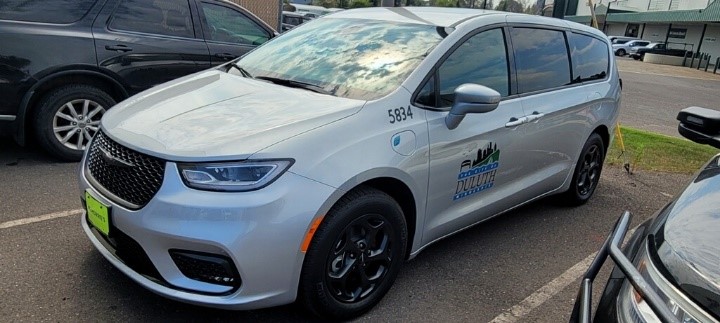Electric Vehicles
The City recently added its first ever electric fleet vehicles! The Fleet Services Manager, Bill Bourassa, was able to purchase an Electric Vehicle (EV) for Property and Facilities Management and a Plug-in Electric Hybrid (PHEV) for the Library. Along with the Sustainability Office, Fleet Services supported the effort to begin planning and testing ways to help lower Fleet emissions and start the electrification process. The City's Energy Coordinator, Alex Jackson, was involved to help plan and install EV charging infrastructure at City sites.
 As a part of the Climate Action Work Plan (CAWP), the City has goals to reduce emissions from fleet vehicles as technology becomes available. Support from the Sustainability Office made the purchase of the first electric fleet vehicles much smoother. Because the City plans out vehicle purchases about three years in advance, many Departments have funding available only for traditional gasoline vehicles. However, funding from the Office was able to fill the gap between the added costs for an EV/PHEV. Luckily, there are also Federal incentives for Clean Commercial Fleet Vehicles that will help to keep these funds revolving in the future.
As a part of the Climate Action Work Plan (CAWP), the City has goals to reduce emissions from fleet vehicles as technology becomes available. Support from the Sustainability Office made the purchase of the first electric fleet vehicles much smoother. Because the City plans out vehicle purchases about three years in advance, many Departments have funding available only for traditional gasoline vehicles. However, funding from the Office was able to fill the gap between the added costs for an EV/PHEV. Luckily, there are also Federal incentives for Clean Commercial Fleet Vehicles that will help to keep these funds revolving in the future.
The City has bold goals of increasing multimodal, carbon-free transportation in the community, which begins with the Municipal fleet. In 2022, Vehicle Fleet accounted for 25% of total Municipal emissions. For these first two electric vehicles, Bill said it was challenging to find EVs due to two factors: supply chain availability and limitations in purchasing contracts. However, with the help of gap funding, Bill was able to purchase these vehicles straight from the dealerships.
The Volkswagen ID.4 EV SUV Pro was purchased for Facilities, or more specifically, Alex Jackson to drive. It was a long time waiting, with the team originally planning for a Ford F150. The all-wheel drive SUV is perfect for all of Alex's needs, especially driving down to the Cities. Alex forecasts the vehicle to handle the winter climate very well and has no worries of driving in the snow. The vehicle gets close to 300 miles per charge with only a 30-minute charging time at 170kW or higher. Within the first week of driving, he had no need to charge it. The long-term energy usage was 2.7 mi/kWh. Through the Energy Fund, PFM was able to purchase a charger which was installed by City electricians. The team is trying to plan ahead the new charging and parking infrastructure locations for future vehicle electrification.
 One of the best features of the vehicle is the lack of idling. Idling reduces your vehicle’s fuel economy, costs you money, and creates pollution. According to DOE, it is estimated that idling personal vehicles generate around 30 million tons of carbon dioxide every year. Alex's EV completely eliminates idling while the library's hybrid makes idle reduction easier. Hybrids shut off the engine when they are not moving and enable slow movement with the engine off.
One of the best features of the vehicle is the lack of idling. Idling reduces your vehicle’s fuel economy, costs you money, and creates pollution. According to DOE, it is estimated that idling personal vehicles generate around 30 million tons of carbon dioxide every year. Alex's EV completely eliminates idling while the library's hybrid makes idle reduction easier. Hybrids shut off the engine when they are not moving and enable slow movement with the engine off.
 By switching the smaller fleet vehicles, Bill is hoping to make electrification more visible and gain support. He finds leadership at the City to have been very openminded and for the most part excited. Moving forward, the biggest obstacle is waiting for technology to catch up to industrial and heavy-duty vehicles. In the meantime, the City is starting with smaller vehicles to get the ball rolling.
By switching the smaller fleet vehicles, Bill is hoping to make electrification more visible and gain support. He finds leadership at the City to have been very openminded and for the most part excited. Moving forward, the biggest obstacle is waiting for technology to catch up to industrial and heavy-duty vehicles. In the meantime, the City is starting with smaller vehicles to get the ball rolling.
Starting smart is key. "We have to figure out where they fit with operations right now and then later, how to change operations to make [EVs] fit," said Bill. The goal is to make the switch where our operations better accommodate EVs. This will be a learning process with the first few vehicles but hopefully will transition over time.
What’s up next? Residents may see some new additions to the City's fleet vehicles in the coming months with more EVs on the way! Bill has plans in the next several months to find a way to purchase 3 additional EVs for Life Safety. Alex will continue the work to plan charging infrastructure too, along with plotting a way to track data and monitor cost savings from fuel purchases and the added costs of electricity.
Thanks to new legislation, an EV purchase might be more feasible than ever. Via rebates introduced in the Inflation Reduction Act, those with an adjusted gross income of less than $300k for couples filing jointly, $250k for heads of households, or $150k for all other filers may receive a rebate of up to $7,500 on EVs purchased between 2023 and 2032. To learn more, check out the Residential Resources tab!




